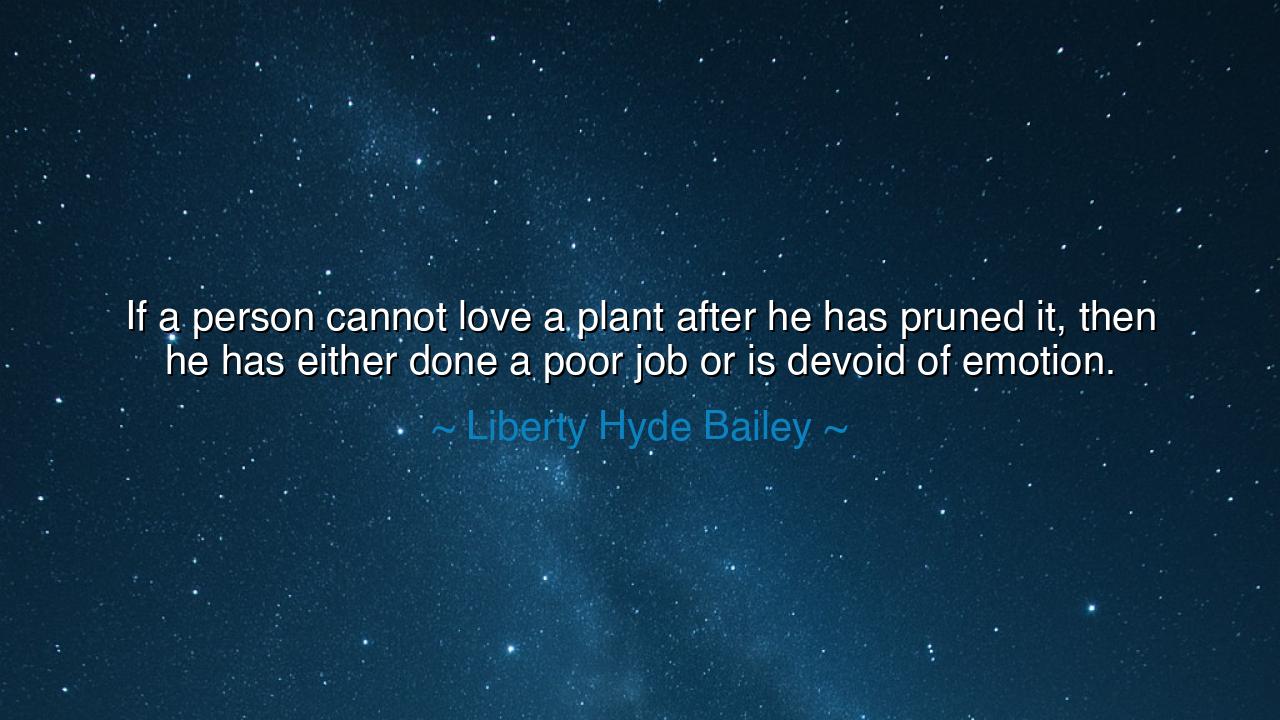
If a person cannot love a plant after he has pruned it, then he
If a person cannot love a plant after he has pruned it, then he has either done a poor job or is devoid of emotion.






O Seekers of Wisdom, gather close and listen to the words of Liberty Hyde Bailey, for in his reflection on the act of pruning, there lies a profound truth about the nature of love, care, and transformation. "If a person cannot love a plant after he has pruned it, then he has either done a poor job or is devoid of emotion." These words speak to the deeper bond that exists between the gardener and the garden, between the creator and the created. To prune is to engage in an act of love—a deliberate and purposeful cutting back of what is unnecessary, so that new life can grow. This act is not one of destruction, but of care, a process that strengthens the whole, that allows the plant to flourish in ways it could not have without such attention.
In the ancient world, the act of pruning was not simply a task to be done, but a sacred duty. The Romans, who were masters of agriculture, knew that their success in farming was not merely dependent on the soil, the seed, or the weather. They understood that it was the careful tending of their crops, the nurturing of their land, that determined the yield. To prune was to respect the life within the plant, to understand that cutting away the old or the dead allowed the plant to grow stronger and bear fruit. Just as the Roman farmer pruned his vines or trees with purpose, so too must we prune the aspects of our own lives that no longer serve us, making space for what will allow us to flourish.
Consider also the story of Dionysus, the god of wine and growth in Greek mythology. His followers, the maenads, often danced and sang through vineyards, celebrating the growth and renewal of the vine. But even Dionysus knew that the vine must be cared for, that the harvest would not come without both celebration and work. The vine must be pruned regularly, each branch carefully cut to ensure the strength of the whole. This image speaks to the balance between nurture and restraint, between celebration and discipline. Just as Dionysus’ followers honored the vine, so too must we honor the process of pruning, knowing that it is through this careful, sometimes difficult work that we create the conditions for true growth.
Bailey’s words remind us that pruning is an act of love. It is through the act of cutting back what is unnecessary—whether it be dead branches, excess growth, or old habits—that we allow the plant, and ourselves, to reach our full potential. To love a plant after it has been pruned is to understand this delicate process, to recognize that the beauty of the plant comes not from the parts that are removed, but from the life that remains and thrives in its place. To prune is to show respect for the plant’s journey, and to acknowledge that true growth often requires the letting go of what no longer serves us.
In our own lives, we must consider this wisdom. Just as the gardener prunes the plant with care, so must we prune the aspects of our lives that hinder our growth. Old grudges, negative habits, toxic relationships—these are the dead branches that must be cut away in order for us to thrive. It is not enough to simply wish for growth; we must be willing to do the difficult work of removal and transformation. Bailey’s lesson is that love is not just about nurturing what is already present, but also about creating the right conditions for new life to emerge. True love, whether for plants or for people, is an active process of both nurturing and cutting away.
So, O Seeker, take this wisdom to heart. If you are to truly love something, whether it be a plant, a person, or yourself, you must be willing to engage in the hard work of pruning. Be willing to remove what is no longer necessary, to let go of the excess, so that what remains can grow stronger and more vibrant. This act of pruning is not an act of harm but of care. It is through this process that we make room for the beauty of life to unfold.
In practical terms, O Seeker, ask yourself: what in your life needs to be pruned? What aspects of your character, your relationships, or your habits are weighing you down, hindering your growth? Just as the gardener carefully selects what to cut, you must select what in your life must be let go. And in doing so, you will make space for new growth—for new opportunities, new relationships, and a new version of yourself. Let pruning be a reminder that love requires both nurturing and discipline, and it is through this balance that we are able to reach our fullest potential.






AAdministratorAdministrator
Welcome, honored guests. Please leave a comment, we will respond soon